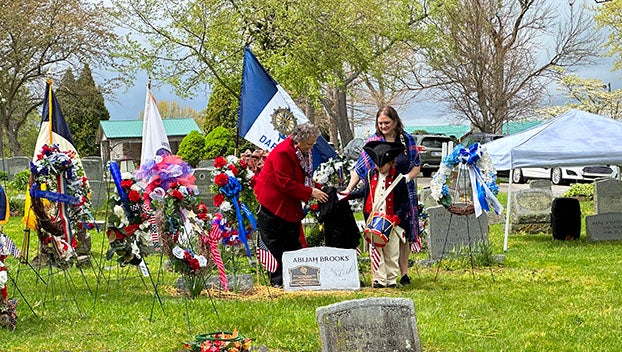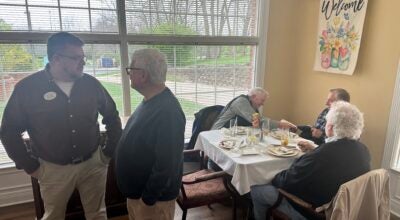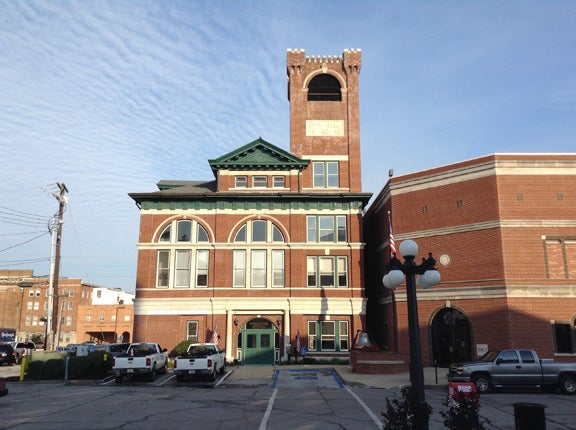Revolutionary War veteran receives grave marker at Winchester Cemetery
Published 8:00 am Saturday, April 22, 2023

- Kelley Orme Beverley, right, unveils the grave marker of her fifth great-grandfather, Abijah Brooks, during Sunday’s ceremony at Winchester Cemetery. (Photo by Matt Cizek)
|
Getting your Trinity Audio player ready...
|
It’s not every day that the earliest days of American history collide with modern-day Winchester.
However, Sunday afternoon was such a day.
Withstanding what at times was a consistent downpour of rain, dozens came out to Winchester Cemetery for a grave marker dedication honoring Revolutionary War veteran and patriot Abijah Brooks.
The event saw collaboration between the National Society of the Daughters of the American Revolution (NSDAR), Sons of the American Revolution (SAR), and Children of the American Revolution (CAR).
“We’re so very glad to have all of you here today to help us celebrate one of our very special Revolutionary War ancestors,” said Anne Fuller, Regent of the Jemima Johnson Chapter of the NSDAR. “We honor those ancestors, and when we can, we do something like this.”
Abijah Brooks was born in 1759 in Medford, Massachusetts, approximately seven miles northwest of downtown Boston. At 17, he served in the Continental Army as a private in Captain John Walton’s Company. Though initially discharged in December of 1776, he reenlisted the same day.
Later, after spending time as a merchant, Brooks came to Clark County and married Nancy Strode, the daughter of Captain John Strode of Strode’s Station, in 1791. Abijah and Nancy had eleven children.
One – Dr. John Strode Brooks – later served and sadly lost his life in the Civil War. He is currently buried in the Lexington Cemetery.
Dr. Brooks’ son, and Abijah Brooks’ grandson, James, went to Texas where he became a Texas Ranger – eventually being inducted into their Hall of Fame – a judge, state representative, and later had Brooks County named for him.
Abijah Brooks died in 1814, and his body was moved to Clark County when the Clark County Bypass was formed. Along with his wife Nancy, Brooks was buried in a family graveyard along Winchester-Lexington Road, about one mile from Winchester.
Family connections run even more profound, including one of Abijah’s daughters being married to the son of former US President John Quincy Adams and the Brooks Building in Chicago being named after family members.
In Winchester, Abijah’s family legacy continues to reign as well.
His maternal fifth great-granddaughter, Kelley Orme Beverley, is a historian for the Jemima Johnson Chapter of the NSDAR.
“To be able to be here and to have a tombstone and to be the historian of the chapter…it makes it even more special,” she said.
Once the event started, many ceremonial procedures took place.
Among them was the posting of the colors, a practice conducted by military color guards of the United States.
The colors are moved from a carried position and placed into a position where they will stand independently.
Among several examples, the colors included an American Flag, the Francis Hopkinson Flag, and the Betsy Ross Flag.
While the Hopkinson Flag was the first approved by Congress, the Betsy Ross Flag – conforming to the Flag Act of 1777 —featured thirteen alternating red and white horizontal stripes and thirteen white stars in a blue canton.
Patrick Wesolosky, President of the Lafayette Chapter of SAR, served as Color Guard Commander.
“It takes a lot of work and effort for a family member to be able to track down and prove that they are a descendant of somebody that was in the American Revolution. It takes even more work for them to be able to make this type of [ceremony] happen,” he said. “We were requested if we would come and provide support.”
Along with the posting of colors during the ceremony, the Preamble to the Constitution was read, the Star Spangled Banner was recited, and a rifle detail paid honor to Brooks near the end of the ceremony with a 21-gun salute and the playing of “TAPS,” as is familiar with funerals of military personnel.
The grave marker is located in the Single Sec. 7 plot of the Winchester Cemetery.
When entering, a straight drive will eventually lead you to find the section on your left-hand side. The marker is just in front and to the left of the grave of Captain John Strode and his wife, Mary Boyle, near a large stone erected to the memory of Strode and the men and women of Strode Station.
For Abijah Brooks, life began over 250 years ago in Massachusetts and a Kentucky grave marker will now honor him forever.
“The most rewarding part about this is that he didn’t have a tombstone, and we weren’t sure where was buried at years ago,” Beverley said. “Being able to share this opportunity [and] this moment with my family, my extended family, DAR, SAR, and CAR friends has been very rewarding.”





